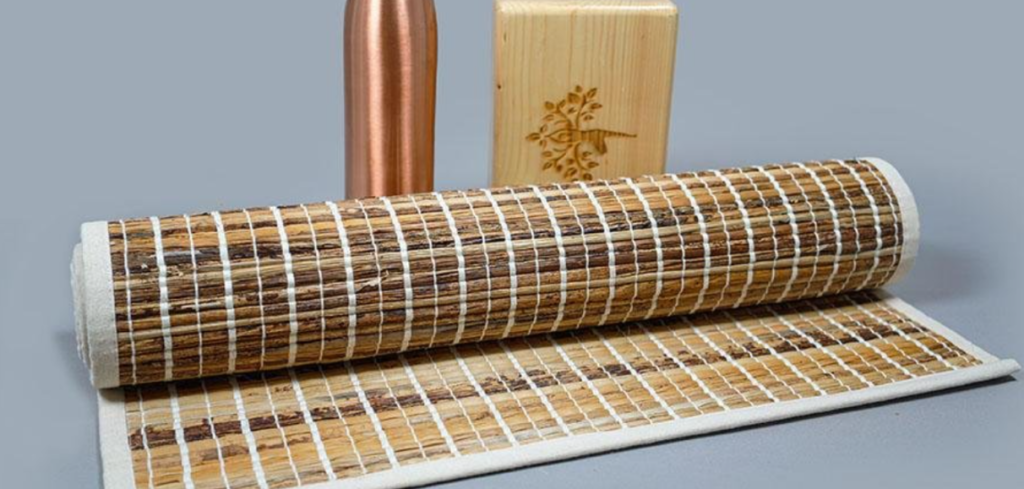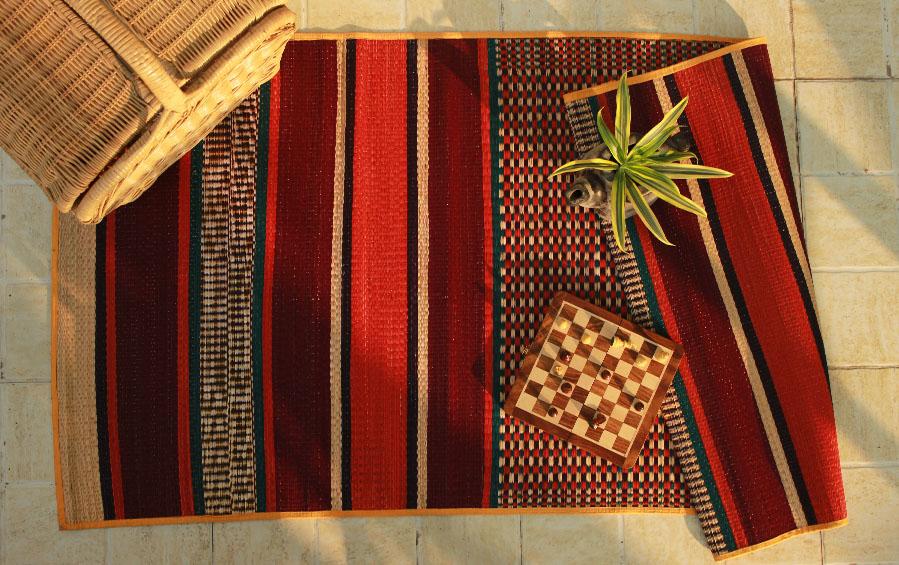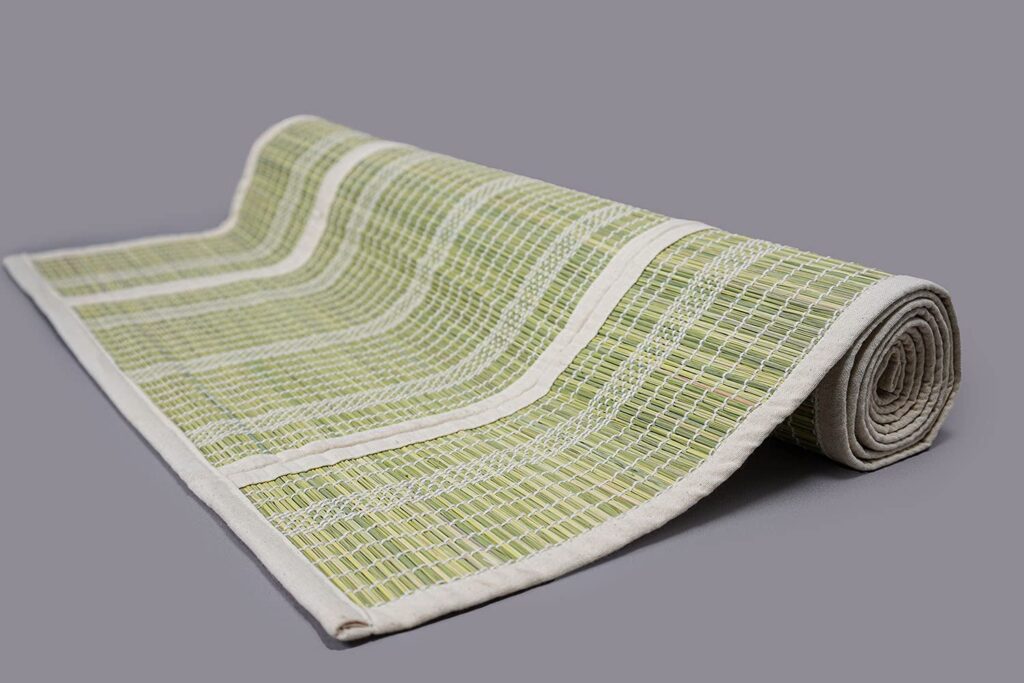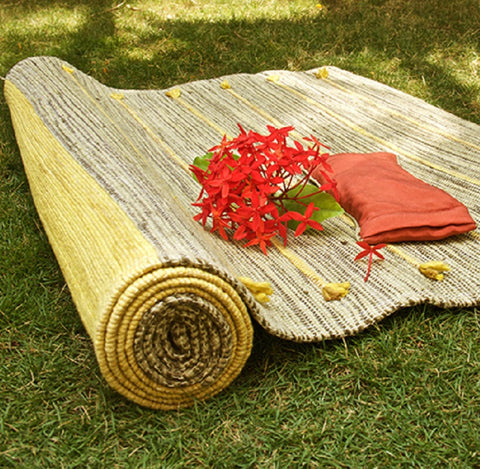
Our eco-friendly yoga mats offer practitioners a natural and organic option, free from synthetic materials and harmful chemicals. Handmade in India, the birthplace of yoga, these mats are crafted from biodegradable natural fibers such as darbha grass, water hyacinth, and banana fiber. They are designed to provide excellent traction, even in challenging climates, with a naturally ribbed texture for a secure grip and a slip-free, hygienic surface. These lightweight and compact mats are convenient for yogis on the go and can be folded or rolled tightly. With their sustainable materials and mineral-based dyes, our mats embody our commitment to caring for the planet while offering a beautiful and environmentally friendly yoga practice.
Water Hyacinth Yoga Mat
Water hyacinth yoga mats are eco-friendly and sustainable mats that are made from the fibrous stems of the water hyacinth plant. These mats provide a natural and comfortable surface for yoga practice while also promoting environmental conservation.

The making process of water hyacinth yoga mats starts with harvesting the water hyacinth plants from water bodies. The plants are then dried and the stems are carefully separated. The fibrous stems are cleaned to remove any impurities and then woven together using traditional weaving techniques. The weaving process creates a sturdy and durable mat that can withstand the demands of yoga practice.
After the mats are woven, they are left to dry and set. Once dried, the mats undergo a finishing process to ensure their quality and longevity. This may involve trimming the edges, reinforcing the corners, and adding a non-slip backing for added stability during yoga poses. The final result is a beautiful and eco-friendly water hyacinth yoga mat that is not only functional but also contributes to sustainable practices by utilizing a renewable resource.
Banana Fiber Yoga Mat
Banana fiber yoga mats offer a sustainable and eco-friendly option for yoga enthusiasts. These mats are crafted from the fibers of banana plant stems, providing a natural and comfortable surface for yoga practice while supporting renewable practices.

To make banana fiber yoga mats, the stems of banana plants are carefully harvested and stripped of their outer layers to extract the long and sturdy fibers. These fibers are then cleaned, processed, and spun into yarn. Skilled artisans weave the yarn together using traditional techniques, creating a strong and durable mat with a smooth and even surface.
After the mats are woven, they are left to dry naturally or using low-temperature methods to preserve the natural properties of the banana fibers. The mats may undergo a finishing process, which can include trimming the edges and adding a non-slip backing for enhanced grip. The result is a sustainable yoga mat that not only provides a comfortable surface for practice but also promotes eco-conscious choices and supports local communities engaged in sustainable agriculture.
Pattamadai
Pattamadai mats, originating from the town of Pattamadai in Tamil Nadu, India, are highly regarded for their exquisite craftsmanship and cultural significance. These mats are handcrafted using Korai grass, a type of grass abundantly found in the region. Pattamadai mats are known for their intricate designs, durability, and traditional weaving techniques.
The process of making Pattamadai mats begins with the harvesting of Korai grass, which is then dried to remove moisture. The dried grass is then split into thin strands and dyed using natural colors derived from plants. Skilled artisans meticulously weave these dyed strands into elaborate patterns and motifs, showcasing their expertise and attention to detail.

The weaving technique used in creating Pattamadai mats is unique and requires precision. Artisans employ traditional handloom methods, skillfully interlacing the grass strands to create a tightly-woven and durable mat. The final product is carefully trimmed and finished to ensure uniformity and a polished appearance.
Pattamadai mats serve various purposes, from being used as prayer mats to floor coverings and decorative pieces. Their intricate designs and vibrant colors reflect the rich cultural heritage of the region. The legacy of craftsmanship and artistic skills passed down through generations is evident in each Pattamadai mat, making them treasured pieces that showcase the skill, creativity, and cultural heritage of the artisans who bring them to life.
Darbha Grass Mats
Darbha grass mats, also known as Kusa grass mats, have a rich history and cultural significance. These mats are handcrafted using the blades of the sacred Darbha grass, which is native to South Asia. Skilled artisans employ traditional weaving techniques to create durable and tightly-woven mats that are known for their eco-friendly and natural properties.
The process of making Darbha grass mats begins with harvesting the grass and carefully preparing it. The grass blades are cleaned, sorted, and woven together using traditional knotting or braiding methods. This meticulous craftsmanship results in sturdy mats that can withstand moisture and provide natural insulation.

Darbha grass mats offer numerous benefits. They are naturally cooling, making them perfect for use in warm climates or during yoga and meditation practices. The mats are also known for their durability and eco-friendliness, as they are made from natural materials and crafted using traditional techniques.
These versatile mats find various applications, from spiritual and religious ceremonies to floor coverings in homes. The earthy tones and organic texture of Darbha grass mats add a touch of rustic charm to any space, reflecting their cultural heritage and connection to tradition.
Cottoncraft Mats
Cottoncraft mats from Kerala are renowned for their exceptional craftsmanship and cultural significance. These mats are made from locally sourced cotton fibers, reflecting the rich textile heritage of the region. Skilled artisans meticulously weave the cotton fibers to create durable and versatile mats that are highly valued for their quality and comfort.
The making process of Cottoncraft mats involves several steps. The cotton fibers are carefully spun and dyed using natural dyes derived from plant extracts. The dyed fibers are then handwoven on traditional looms, with intricate patterns and designs taking shape. The weavers pay meticulous attention to detail, ensuring that each mat is of superior quality and exhibits the traditional motifs that are characteristic of Kerala’s textile art.

Cottoncraft mats offer numerous advantages. They are highly absorbent, making them suitable for use in humid climates. The natural cotton fibers provide a soft and comfortable surface, ideal for various activities such as yoga, meditation, or simply relaxing. These mats are also easy to clean and maintain, adding to their practicality and longevity.
Cottoncraft mats not only serve as functional floor coverings but also showcase the artistic and cultural heritage of Kerala. The vibrant colors, intricate patterns, and expert craftsmanship make them a symbol of Kerala’s traditional textile art. Whether used indoors or outdoors, Cottoncraft mats add warmth, comfort, and a touch of cultural elegance to any space.
